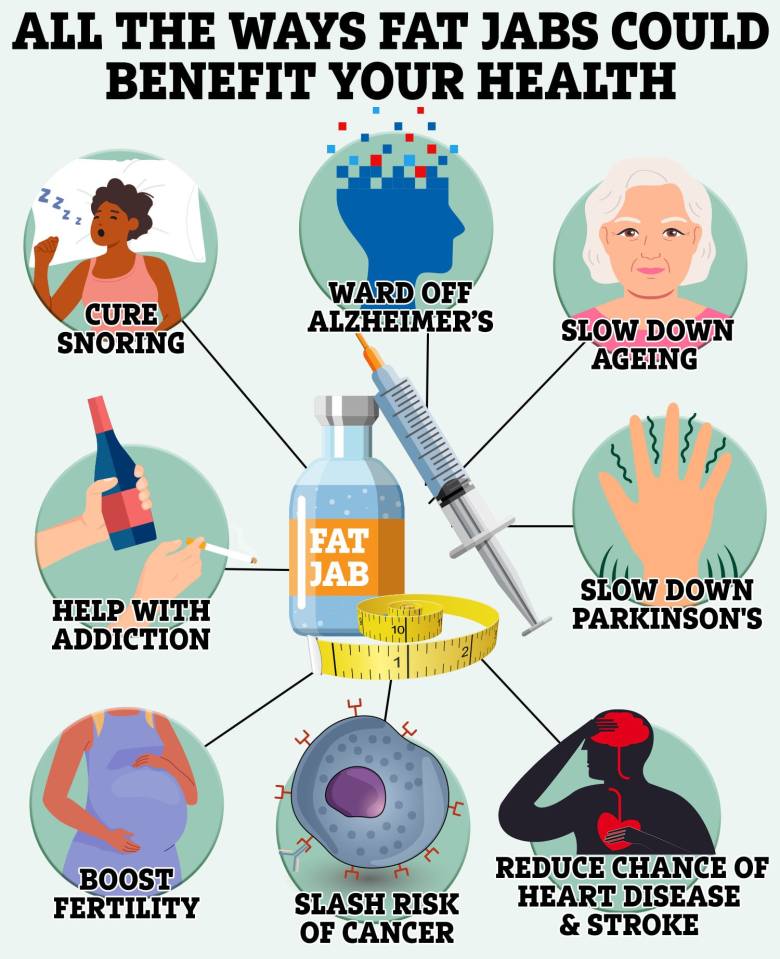FAT jabs like Mounjaro and Wegovy could slash boozing by two-thirds, a study has shown.
It’s not the first time the weight loss medication has shown promise for helping those with poor drinking habits curb their cravings.
The class of GLP-1 medications mimic the action of the natural GLP-1 hormone, which plays a key role in regulating blood sugar levels, appetite, and digestion.
They were initially developed to treat type 2 diabetes but have become a breakthrough in obesity treatment, too.
Now, anecdotally, people have reported that their desire to drink is slashed once they start GLP-1.
The study was led by Professor Carel le Roux, of University College Dublin and presented at this year’s European Congress on Obesity (ECO 2025).
Professor Le Roux said: “GLP-1 analogues have been shown treat obesity and reduce the risk of multiple obesity-related complications.
“Now, the beneficial effects beyond obesity, such as on alcohol intake, are being actively studied, with some promising results.”
The team looked at data on the alcohol intake of patients who were being treated for obesity at a clinic in Dublin.
It involved 262 adults with a BMI of over 27 with an average weight of 15st 6lb/98kg, and average age of 46 years.
They were prescribed either semaglutide (Ozempic, Wegovy) or liraglutide (Saxenda) for weight loss. Mounjaro is the brand name for another medication, tirzepatide.
Thirty-one patients did not drink, 52 rarely drank, and 179 were regular drinkers, based on self reporting.
Some 188 of the 262 patients were followed-up for an average of four months. None of them had increased their alcohol intake.
Average alcohol intake decreased from 11.3 units per week to 4.3 units per week after four months of treatment with the GLP-1 meds.
That’s the equivalent of drinking almost four large glasses of wine to one and a bit. Or, about six or seven pints of beer to roughly two.
Even more so, among the regular drinkers, intake decreased from 23.2 units per week to 7.8 units.
The reduction of 68 per cent is comparable to that achieved by nalmefene, a drug used to treat alcohol use disorder in Europe, notes Professor le Roux.
He adds: “The exact mechanism of how GLP-1 analogues reduce alcohol intake is still being investigated but it is thought to involve curbing cravings for alcohol that arise in subcortical areas of the brain that are not under conscious control.
“Thus, patients report the effects are ‘effortless’.”
Alcohol use disorder is a relapsing condition that accounts for 2.6 million deaths a year – 4.7 per cent of all deaths globally.
Around one in 20 adults in England are deemed to be heavy drinkers – men who drink more than 50 units a week and women who drink more than 35 units.
Deaths from alcohol use at a record high. More than 8,200 people died because of alcohol in 2023 which is 42 per cent higher than in 2019.
Treatments such as cognitive behavioural therapy (CBT), therapies that aim to strengthen motivation to stop or reduce drinking and medication can be very successful in the short-term.
But 70 per cent of patients relapse within the first year, the study authors noted.
Everything you need to know about fat jabs
Weight loss jabs are all the rage as studies and patient stories reveal they help people shed flab at almost unbelievable rates, as well as appearing to reduce the risk of serious diseases.
Wegovy – a modified version of type 2 diabetes drug Ozempic – and Mounjaro are the leading weight loss injections used in the UK.
Wegovy, real name semaglutide, has been used on the NHS for years while Mounjaro (tirzepatide) is a newer and more powerful addition to the market.
Mounjaro accounts for most private prescriptions for weight loss and is set to join Wegovy as an NHS staple this year.
How do they work?
The jabs work by suppressing your appetite, making you eat less so your body burns fat for energy instead and you lose weight.
They do this my mimicking a hormone called GLP-1, which signals to the brain when the stomach is full, so the drugs are officially called GLP-1 receptor agonists.
They slow down digestion and increase insulin production, lowering blood sugar, which is why they were first developed to treat type 2 diabetes in which patients’ sugar levels are too high.
Can I get them?
NHS prescriptions of weight loss drugs, mainly Wegovy and an older version called Saxenda (chemical name liraglutide), are controlled through specialist weight loss clinics.
Typically a patient will have to have a body mass index (BMI) of 30 or higher, classifying them as medically obese, and also have a weight-related health condition such as high blood pressure.
GPs generally do not prescribe the drugs for weight loss.
Private prescribers offer the jabs, most commonly Mounjaro, to anyone who is obese (BMI of 30+) or overweight (BMI 25-30) with a weight-related health risk.
Private pharmacies have been rapped for handing them out too easily and video calls or face-to-face appointments are now mandatory to check a patient is being truthful about their size and health.
Are there any risks?
Yes – side effects are common but most are relatively mild.
Around half of people taking the drug experience gut issues, including sickness, bloating, acid reflux, constipation and diarrhoea.
Dr Sarah Jarvis, GP and clinical consultant at patient.info, said: “One of the more uncommon side effects is severe acute pancreatitis, which is extremely painful and happens to one in 500 people.”
Other uncommon side effects include altered taste, kidney problems, allergic reactions, gallbladder problems and hypoglycemia.
Evidence has so far been inconclusive about whether the injections are damaging to patients’ mental health.
Figures obtained by The Sun show that, up to January 2025, 85 patient deaths in the UK were suspected to be linked to the medicines.









